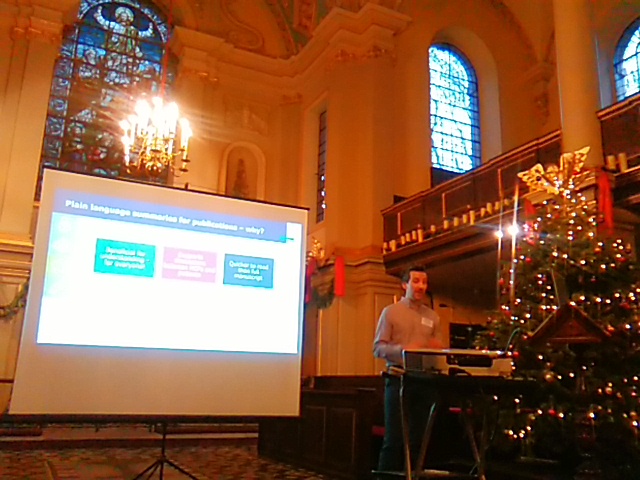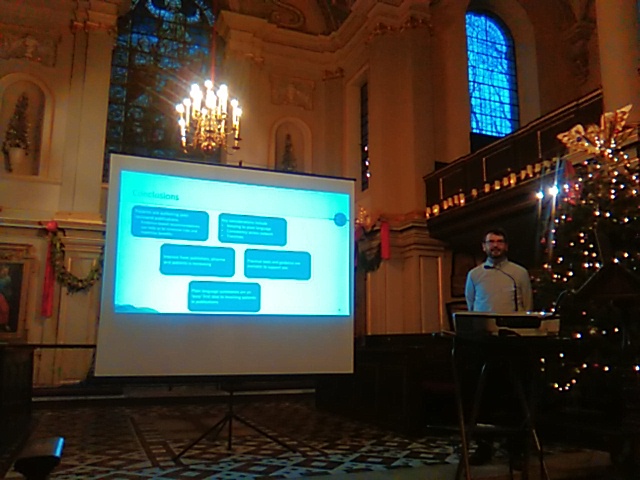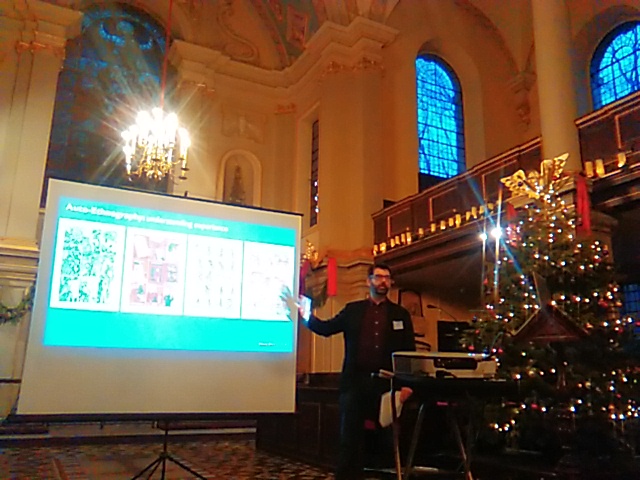|
MORE DETAILS
|
AFTERNOON WORKSHOP - 10 DECEMBER 2019 - LONDON
|
Involving patients in research and medical writing
Following last year's successful end-of-year meeting, once again we welcomed a lively audience to tackle an important, ongoing topic for the MedComms community. It was also an opportunity to relax with peers, to celebrate the year that is ending and to look forward to the year to come. The event was free to attend thanks to the generosity of the sponsors, Stgilesmedical.
Scroll down for presentation slides, pictures and a summary report, prepared by Michael Achiampong.
Date: 10 December 2019
Venue: Stgilesmedical, Vestry House, 60 St Giles High Street London WC2H 8LG
Timing:
13:00-14:00: Warm lunch (supplied by Franx Restaurant)
14:00-14:10: Introduction and welcome
Peter Llewellyn (NetworkPharma Ltd) and Steven Walker (St Gilesmedical Ltd and Stgilesmedical GmbH)
14:10-14:30 How patients and the public are being involved in co-producing the journal content
Tessa Richards, Editor, BMJ
14:30-14:50 How can pharmaceutical companies work with patients for patients?
Simon Page, Global Medical Publications and Communications Manager, Ipsen Bioinnovation
[DOWNLOAD SIMON'S PRESENTATION - PDF]
14:50-15:10 The agency perspective - Patient authorship and plain language summaries
Phil Matthews, Portfolio Director and Team Lead, Envision Pharma Group
[DOWNLOAD PHIL'S PRESENTATION - PDF]
15:10-15:30 Being part of the team: research and art from the patient's perspective
Tony Pickering, Patient and Medical Artist, St Gilesmedical Ltd London and Pick Art
15:30-15:50 All I want for Christmas... How to write healthcare information for adults and children that 'minds the gap'
Jane Lamprill, Paediatric Advisor and Specialist Medical Writer (lay language communications), Paediatric Research Consultant, Please Read Carefully
15:50-16:10 Writing and testing lay-friendly health information
Laura Myden, Project Manager and Operations Deputy, Luto
[DOWNLOAD LAURA'S PRESENTATION - PDF]
16:10-16:30 Question and Answer session
Summary and Keynote:
16:30-17:00 The Patient Involvement Christmas Stocking - Some presents unwrapped
Richard Stephens, Editor of Research Involvement and Engagement, and Veteran Patient Advocate
[DOWNLOAD RICHARD'S PRESENTATION - PDF]
Networking
17:00-18:30: Homemade mince pies, bubbly and music from emerging singer/song writing talent Neev-Downes



Some personal, aide-memoire notes, jotted down and shared by Michael Achiampong, BSc (Hons) Pharmacy, MSc, MRPharmS. Locum pharmacist and aspiring medical editor.
1st presenter = Dr Tessa Richards, Senior Editor www.bmj.com
Title: "How patients and the public are being involved in co-producing journal content".
The BMJ readership are "jobbing doctors" and some of her key messages included:-
* The BMJ issue of 18th September 1999 featured an article by Goodacre and Lockwood: "Involving patients in clinical research improves the quality of research" BMJ 1999; 319:724 https://doi.org/10.1136/bmj.319.7212.724
* patient involvement has become a growing global movement. Amplified and accelerated by patient forums' engagement with social media.
* BMJ are consciously co-producing/commissioning editorial content involving patients/patient associations. Asking researchers questions: How and when were patients/public involved? Methodology study check: for co-designing surveys etc. How and when would results be disseminated? The growing role of patients' peer review.
* BMJ contributors must apply a mandatory patient-public partnership #PPP statement when submitting pieces e.g. educational items news and views: opinions, essays and podcasts for publication.
* Grant awarding bodies e.g. The Wellcome Trust, MRC etc are also asking for this #PPP statement.
Delegates were encouraged to join the discussion and debate @BMJPatientEd
A passing reference was made to "Rethinking medicine" at the Mayo Clinic, Rochester, MN, USA. [A similar initiative is "Realistic medicine" in Scotland].
2nd presenter = Simon Page. Global medical publications and communications manager, Ipsen Bioinnovations www.ipsen.com/uk [oncology + neurosciences + rare diseases]
Title: "How can pharma work with patients for patients"?
* Simon's opening remarks were that we all have a vested interest as patients and parents/ carers that pharma engages with patients as people.
* Open access [OA] for all Ipsen research has become mandatory as of January 2019. Endorsed by Ipsen's CEO David Meek: "Patients cannot wait"
* Plain language summaries [PLS] for all abstracts.
* Proactively involving all patients at all stages of the publication planning, writing and post-publication cycle. And acknowledging patients' contributions.
* Enabling OA for Ipsen patients is vital because what Ipsen does is "Life and Death.
* Open Pharma [OP] was also recommended to us by Simon to research further.
* Some reasons why PLS are beneficial for patients include:-
(i ) Increasing everyone's understanding of [rare] diseases and medicines etc. (ii) Democratising information and (iii) improving healthcare literacy etc.
The importance of thanking patients for their research participation with follow-up letters. Outlining the next steps and future development plans. The EMA have a summary of information requirement for laypersons
In response to Steven Walker's question: Simon estimated journal costs =GBP000s per article.
Peter's question: comparing Ipsen versus Shire's different OA policies? Simon reiterated Ipsen's commitment to making all affiliated research OA. Potentially, negotiation required when an Independent Researcher approaches Ipsen for research grants.
Delegate John asked a question about the publication of negative clinical trial data [as championed by Dr Ben Goldacre of EBM Datalab and author of Bad Pharma [2012] and Bad Science [2009]. Ipsen have found that pharma/SME start-ups are better than academia/IPOs in reporting negative trial data. Simon suggested that there might be a "sweet spot/middle ground" where OA survives and thrives aka "Coalition S" [Research Information, S/S19]
An interesting BMJ feature is: "unpublished clinical trial of the week".
3rd presenter = Phil Matthews. Portfolio director and team lead, Envision Pharma Group.
Title: "The agency view: patient authorship and plain language summaries [PLS]".
* Explanation of patient authorship w.r.t. Friedreich's ataxia patients and their parents
* Plain language summaries and (iii) some practicalities.
Two useful references quoted by Phil were: (a) Preferences for receiving results from a rare diseases clinical trial: a survey of subjects with Friedreich’s Ataxia and their parents. Amelot, Vincent et al. Pharm Med. October 2017, Volume 31, Issue 5, pp.329-337; and (b) Hoos, Anton et al. 2015. Partnering with patients in the development and lifecycle of medicines. A call to action. Therapeutic Innovation and Regulatory Science. Special Populations: Review. Vol. 49(6) 929-939 © The authors 2015 and DIA.
* Being mindful that "words" have different meanings in different contexts.
* So enlisting 9 y/o's a.k.a Santa's little helpers: a novel approach to developing patient information leaflets". © Dr Catrin Wigley, Vittoria Bucknall and Simon Fleming in BMJ 2017; 359:j5565 https://doi.org/10.1136/bmj.j5565 [accessed 9/12/19]
Insightful to learn that the "average reading age in the UK is 9 years of age"!
* Early, first steps with patients and the publications lifecycle.
* Overcoming compliance concerns and adverse events per ABPI/EFPIA codes and FDA guidance.
* The world's first systematic review with patients as authors:
Prof. Karen Woolley's ISMPP 2020 update sponsored by Envision Pharma Group.
* Plain language summaries [PLS] empower patients. Adding value to patients adds value to journals. Be mindful of "phonetics" of medical conditions and the names of medicines [e.g. monoclonal antibodies]. Pembrolizumab, anyone?
* There are 3 types of summaries:
(a) Clinical Studies Reports (CSR): PLS of clinical trials > Lay Summaries [mandatory per EU Directives].
(b) Research Data: (i) peer reviews > plain language summaries
(c) APLS i.e. Congress abstracts>APLS, abstracted plain language summaries.
* From ASCO/ESMO; ASH/EULAR etc and "finding common ground".
4th presenter = Tony Pickering. Patient and carer and medical artist. St. Gilesmedical Ltd and Pick Art.
Title: "Being part of the team: research and art from [a] patient's perspective".
Perhaps the most heartfelt presentation of the afternoon. On being diagnosed with type one diabetes mellitus [T1DM]. Tony's creative and imaginative use of graphic novels and comics to describe his indescribable range of human emotions. And also how art helped him cope with the lifelong diagnosis. Interesting that the "journey of fulfilling a prescription" was completely new to Tony. Perhaps there's a role here for MedComms and pharma here? Resourceful Tony somehow created an image illustrating the duality of "self-harming". But without being too graphic or stereotypical. Bravo! www.Pick-Art.co.uk
5th presenter = Jane Lamprill. Paediatric advisor and specialist medical writing Lay Language communications.
Title: Please read carefully. "How to write healthcare information for adults and children mindfully".
Personally, I found this presentation paradoxical with its overlong title! I did agree with the simplification of the NHS SEPSIS poster alerting parents when to contact 999 or go to AandE. The importance of user testing and feedback. Consider working with artists to optimize the use of colour(s) when writing for young children. In contrast, brief, eye-catching information works better for teenagers. Avoid words with potential double-meanings: e.g. study/trial; bugs/infections; airways/respiratory tubes etc.
6th presenter = Dr Laura Myden. Project manager and Operations director. www.luto.co.uk
Title: "Writing and testing lay-friendly health information".
A resource intensive but continuously iterative user testing focused on patients and the general public interactions. Use everyday words >>> jargon; clear headings; bullet points; table of contents.
Jane Lamprill asked whether "indexing" would also be useful for helping parents in finding emergency info quickly?
7th presenter = Keynote = Richard Stephens. Editor, Research Involvement and Engagement. Veteran patient advocate.
With useful Xmas-related graphics from his 19 y/o son. Perhaps a key lesson is to check and review the slide deck before you presenting them publically! Or risk potentially unwanteed surprise(s)! Research matters for patients/carers. Upskilling the NHS workforce; offers taxpayers’ value for money and credit to pharma. Note also: www.ncri.org/cancerpatients experiences. Grateful for invitation to the annual patient-led congress #efpBarcelona 2020.
* Importance of embracing digital platforms to reach a broader, inclusive and diverse patients in trials. For example, The Digitome [eyeforpharma webinar: 12/11/19]
* The near-future: (i) AI/surgical robotics (ii) Pharmacogenomics: the microbiome and nutrigenomics. The 100,000 genome project [includes the West Midlands AHSN]. Stratified medicines; ethics of CRISPR/gene editing (iii) nanotechnology (iv) real-world data/evidence to support patients. Wearables/ smart tracking devices and biosensors e.g. watches. diagnostics and prognostics. Check out data embassies hosted by the dissemination centre at www.dc.nihr.ac.uk
Thank you very much St.Gilesmedical staff for serving warm lunch and mince pies etc.
Kudos to singer/songwriter Ms Neev Downes for background music on acoustic guitar.
To make sure you're included in announcements about future events just email Peter Llewellyn, if you haven't already done so, to register your interest.
|
|
|

